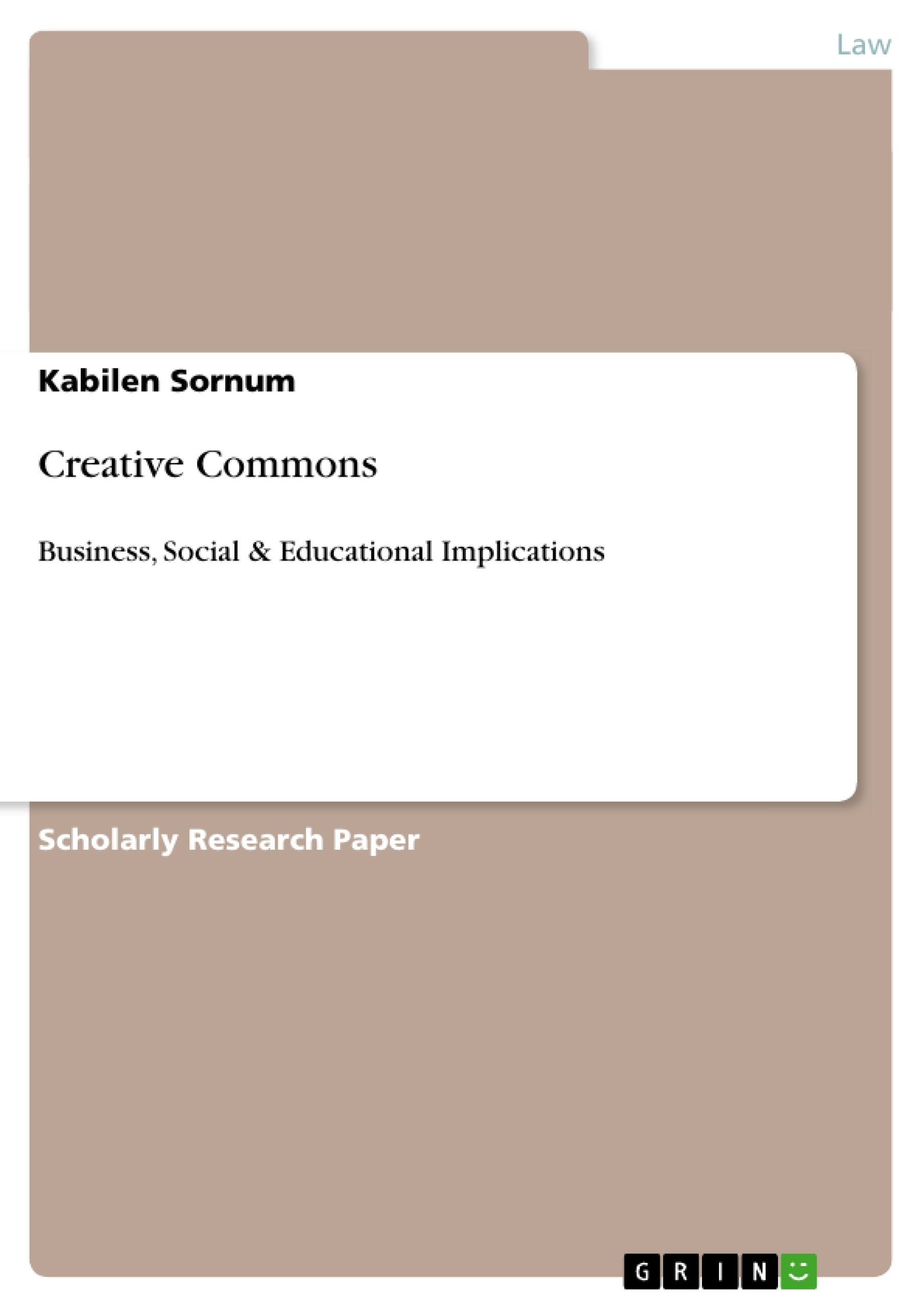Excerpt
Creative Commons
Business, Social & Educational Implications
Kabilen K. Sornum,
March 07, 2010
Abstract Creative Commons is an extension to digital contents licensing. It has brought a different dimension to the way content producers share their data among other entities.
It provides free, easy-to-use legal tools that give everyone from individual user generated content creators to major companies and institutions a simple, standardized way to pre-clear usage rights to creative work they own the copyright to. This has had serious business and social impacts. In this paper, the concept of Creative Commons licensing is introduced, followed by a description of the different types of licenses. Impacts in the business and social arena are also outlined.
Keywords creative commons copyright internet security business impacts copyleft
1 What is Creative Commons?
Creative Commons is a non-profit organization that works to increase the amount of creativity (cultural, educational, and scientific content) available in the commons the body of work that is available to the public for free and legal sharing, use, repurposing, and remixing (Creative Commons, 2010d). It was founded in 2001 with the generous support of the Center for the Public Domain, Creative Commons is led by a board of directors that includes cyberlaw and intellectual property experts, researchers, educators and journalists. (Creative Commons, 2010a)
Creative Commons provides free, easy-to-use legal tools that give everyone from individual user generated content creators to major companies and institutions a simple, standardized way to pre-clear usage rights to creative work they own the copyright to. CC licenses let people easily change their copyright terms from the default of all rights reserved to some rights reserved.
Creative Commons licenses are not an alternative to copyright. They apply on top of copyright, so you can modify your copyright terms to best suit your needs. Creative Commons have collaborated with copyright experts all around the world to ensure that our licenses work globally. Major media and technology companies, leading universities, top scientists, and world-renowned artists all take advantage of the Creative Commons approach to copyright. Most importantly, there are millions of regular people around the world who use CC licenses to help increase the depth, breadth, and quality of creativity that is available to everyone for free and legal use. (Creative Commons, 2010d)
The ultimate objective of Creative Commons is to place creative works into resources that will make them freely available to the general public. Second, instead of trying to reduce the appetites of greedy rights holders and overzealous lawmakers, Creative Commons seeks to cure a symbolic failure of the present copyright regime. This failure is marked by the increasing perception of copyright as an impediment to the creative process or the enjoyment of cultural resources, rather than as a necessary element of the creative process and access to artistic culture. (Dusollier, 2005)
2 Creative Commons Licenses
There are six types of Creative Commons licenses (Creative Commons, 2010c). Below is a list of them starting with the most accommodating license type one can choose and ending with the most restrictive license type. A short description of each license is also given.
– Attribution(CC-BY)
– Attribution Share Alike (CC-BY-SA)
– Attribution No Derivatives (CC-BY-ND)
– Attribution Non-Commercial (CC-BY-NC)
– Attribution Non-Commercial Share Alike (CC-BY-NC-SA)
– Attribution Non-Commercial No Derivatives (CC-BY-NC-ND)
[...]
, K.K. Sornum
Faculty of Law, Business and the Creative Arts,
James Cook University Australia
- Quote paper
- Kabilen Sornum (Author), 2010, Creative Commons, Munich, GRIN Verlag, https://www.grin.com/document/147342
Publish now - it's free






















Comments